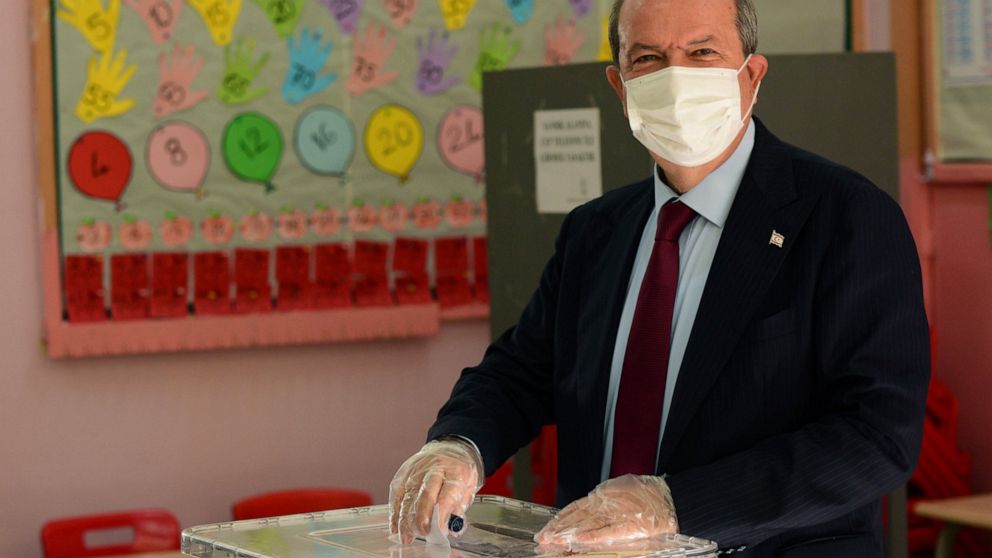Hardliner beats leftist in Turkish Cypriot leadership poll
A hardliner who favors even closer ties with Turkey and a tougher stance with rival Greek Cypriots in peace talks has defeated the leftist incumbent in the Turkish Cypriot leadership runoff
NICOSIA, Cyprus — A hardliner who favors even closer ties with Turkey and a tougher stance with rival Greek Cypriots in peace talks has defeated the leftist incumbent in the Turkish Cypriot leadership runoff Sunday.
Turkish Cypriot broadcaster BRT says with 100% of the votes counted, Ersin Tatar secured 51.74% of the vote compared to 48.26% for Mustafa Akinci.
Tatar appears to have benefited from a higher turnout in the runoff, managing to rally supporters from the approximately 200,000-strong electorate who may not have voted in the first round.
Mustafa conceded defeat to Tatar.
THIS IS A BREAKING NEWS UPDATE. AP’s earlier story follows below.
NICOSIA, Cyprus (AP) — A hardliner who favors even closer ties with Turkey is leading by a narrow margin against the leftist incumbent in the Turkish Cypriot leadership runoff Sunday, according to unofficial results.
Turkish Cypriot broadcaster BRT says with 84% of the votes counted, Ersin Tatar secured 52.12% of the vote compared to 47.88% for Mustafa Akinci.
Tatar appears to have benefited from a higher turnout in the runoff, managing to rally supporters from the approximately 200,000-strong electorate who may not have voted in the first round.
Akinci, 72, is a champion of Turkish Cypriots who oppose Turkey’s complete domination of their affairs. Tatar, 60, advocates fully aligning Turkish Cypriot policies with those of Turkey, the region’s patron.
The Mediterranean island nation of Cyprus was split in 1974 when Turkey invaded after a coup by supporters of union with Greece. Only Turkey recognizes a breakaway Turkish Cypriot state in the north that is economically and militarily dependent on Ankara. The island’s internationally recognized government has its seat in the Greek Cypriot south and is part of the 27-nation European Union.
The tussle between Turkish Cypriots who seek to retain more say in how they’re governed and those who want to walk in lockstep with Turkey has been a prominent feature in past leadership races but this contest seems more polarized than ever.
Akinci has alleged that Turkey has engaged in “unprecedented” interference throughout the campaign in favor of Tatar and that he and his family have received threats to drop out of the race.
“We know that things happened that shouldn’t have happened,” Akinci said after casting his ballot, adding that he wishes voters will look back on Sunday’s election with “pride for Turkish Cypriot democracy and will.”
Tatar urged voters to get out and beat the first round’s record-low turnout.
“The important thing is to reflect our will and send out a message to the world,” Tatar said after voting.
A first test for the winner will be a meeting with Greek Cypriots and Cyprus’ “guarantors” — Greece, Turkey and Britain — that U.N. Secretary-General Antonio Guterres is expected to call soon. The aim will be to figure out if there’s enough common ground to restart dormant peace talks.
Nearly five decades of U.N. facilitated attempts at achieving reunification based on a federal framework have failed.
Akinci believes that federation is the only way toward a peace accord. Tatar shares the Turkish government view that federation may not be the most viable option and alternatives such as a two-state deal should be pursued.
Tensions have soared this summer in waters off Greece and Cyprus over sea boundaries and energy exploration rights after Turkey redeployed a research vessel near the Greek island of Kastellorizo. The move cast doubts on fresh talks aimed at resolving the dispute.
Turkey insists it has every legal right to search for hydrocarbons in waters where Greece and Cyprus claim exclusive economic rights. The Greek and Cypriot governments accuse Turkey of violating international law. The dispute raised fears of a military conflict between Greece and Turkey, which are NATO members but are strong regional rivals.
![]()


